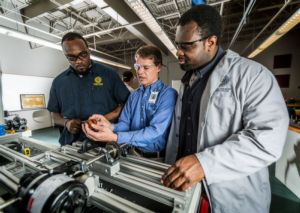
The Advanced Technological Education (ATE) Community continues to thrive, marked by significant accomplishments and initiatives that are advancing technological education and fostering diverse talent in community college STEM fields. In this post, we highlight recent innovations and achievements from grantees and provide links to previous posts that provide more details.
Expanding Horizons with GEOBRIDGES
The GEOBRIDGES program at Central Wyoming College (CWC) is making significant strides in its mission to diversify and strengthen the geospatial workforce. Now in its second summer, GEOBRIDGES utilizes ATE funding to offer stipends for students engaging in applied geospatial science and technology research in the Wind River Mountains. In 2023, 20 students participated, with 30% being Native Americans from local tribal communities. The program offers courses that contribute to CWC's Expedition Science certificate and associate degree, preparing students for entry-level technician roles. Students partake in fieldwork typically reserved for advanced undergraduates and graduates, including presenting at conferences and conducting scientific research.
The program’s success in recruiting and retaining diverse students has been highlighted in the ATE Impacts Video series and the recent ATE Impacts book. Supported by various organizations, including the University of Wyoming NSF EPSCOR, WY NASA Space Grant Consortium, NIH's WY INBRE program, and the CWC Foundation, the program ensures comprehensive support for students, including field logistics and tuition coverage. Explore more about GEOBridges on the ATE Impacts blog.
Eric N. Wooldridge Honored with National Science Board’s Science and Society Award
Eric N. Wooldridge, a principal investigator of four ATE grants at Somerset Community College in Kentucky, has been awarded the prestigious Science and Society Award by the National Science Board. This award recognizes his efforts in expanding additive manufacturing education across Kentucky. Wooldridge, in collaboration with Sheri McGuffin, has trained over 200 educators and introduced 3D printing to 5,000 students, leading to the first state-endorsed career and technical education pathway for additive manufacturing in Kentucky.
During the COVID-19 pandemic, Wooldridge adapted by creating remote learning materials and shipping 3D printers to educators. This inventive approach has not only garnered public attention but also facilitated statewide scaling of additive manufacturing education. Wooldridge views community colleges as pivotal in transforming regional economies and education systems. His current focus is on expanding the model to support the semiconductor fabrication workforce and other advanced manufacturing fields using low-cost virtual reality technologies. Read more aobut Woolridge on the ATE Impacts site.
Promoting Technical Education with the ATE Impacts Book
The ATE Impacts 2024-2025 book celebrates the 30th anniversary of the program and showcases the work of the National Science Foundation's Advanced Technological Education Community. This publication showcases the work of the National Science Foundation’s Advanced Technological Education Community, featuring contributions from 24 centers and 35 projects across the seven ATE areas, as well as applied research. With a foreword from NSF Director Sethuraman Panchanathan, the book highlights the innovative work by ATE grantees, encouraging broader participation in the program by academic institutions, educators, and industry partners.
For three decades, the NSF's Advanced Technological Education program has provided professional development opportunities for educators, broadened students' knowledge, and enhanced technicians' skills. The ATE program has significantly influenced the career paths of individuals from historically underrepresented populations in STEM fields, adding diversity to the technical workforce. Digital and print versions of the book are available, offering a valuable resource for promoting STEM education and the ATE program to deans, department chairs, industry partners, students, new faculty, and staff members.
The ATE Impacts website has also recently been redesigned and now includes the newly released ATE photo library. Feel free to pursue the site for photos, videos, and in-depth blogs and information on ATE community success stories.
Accelerating Workforce Development with the CASCADE Apprenticeship Program
The CASCADE Apprenticeship Program, in partnership with Silicon Crossroads (led by ARI (Applied Research Institute), Purdue University, and Synopsys Inc.), as well as the Micro Nano Technology Education Center (MNT-EC) and SEMI Foundation, combines academic and industry experience to help accelerate a skilled workforce and grow a qualified domestic semiconductor ecosystem. With a dedicated focus on semiconductor chip design, the CASCADE Apprenticeship Program offers academic opportunities at Purdue University and hands-on experience with industry sponsors, such as program partner Synopsys. This program is a vital step toward developing a robust talent pipeline for the semiconductor industry, ensuring that the next generation of technicians is well-prepared to meet the demands of this critical sector. Learn more about the Spring 2025 CASCADE Apprenticeship Program on their website.
Through these programs and initiatives, the ATE Community continues to make contributions to technological education, workforce development, and the promotion of STEM fields. The collective efforts of educators, students, industry partners, and administrators are shaping a bright future for the technical workforce, ensuring it is diverse, skilled, and ready to meet the demands of industry.
 Subscribe
Subscribe


 See More ATE Impacts
See More ATE Impacts
Comments
There are no comments yet for this entry. Please Log In to post one.